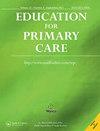Supporting medical students who experience discrimination: perspectives of General Practice tutors in primary care.
IF 1.5
Q3 PRIMARY HEALTH CARE
引用次数: 0
Abstract
It is well documented that the current NHS environment has a high prevalence of discrimination [1], and this also adversely impacts on the clinical learning environment for medical students [2]. As UK medical undergraduate curricula move towards increased community-based education [3], the General Practice (GP) setting and GP tutors are increasingly important in these critical discussions of how to address discrimination. GPs are uniquely placed to develop inclusive and respectful learning environments and support medical students when they are faced with discrimination. Understanding the training needs of GP tutors is key in addressing discrimination and creating supportive inclusive clinical learning environments. There is a lack of consensus on the best form of training in this area, with mixed evidence on the success of approaches such as unconscious bias or active bystander training [4]. We therefore took a needs-based approach when developing training for the GP tutors at Imperial College London, and conducted a survey exploring GP tutors’ perspectives and training needs in addressing discrimination. We received 89 responses. 45% of GP tutors reported that they had experienced discrimination in their medical education role, which mirrors the high prevalence reported by the primary care workforce more widely in clinical, management and administrative roles [1]. We found that although 93% of GP tutors felt confident recognising discrimination and 83% felt confident discussing it with medical students, 62% were unfamiliar with the medical school support systems for issues related to discrimination. Specifically, GP Tutors were unfamiliar with the medical school’s process for either staff or students to report discriminatory behaviours and how to access the available specialist support. GP tutors who had previously received training on discrimination reported greater self-confidence in addressing it, highlighting the importance of faculty training in this area. Furthermore, most GP Tutors did express an interest in having additional training on discrimination particularly in an online format. Topics that GP tutors stated would be useful to cover included: strategies to identify and address discrimination, raising self-awareness and types of discrimination. These results have implications for wider training in primary care, in areas such as raising awareness of local reporting systems and identifying and addressing discrimination when it happens. We would encourage others involved in faculty training to utilise a similar needsbased approach when developing resources for their educators.支持遭受歧视的医学生:初级保健全科医生的观点。
本文章由计算机程序翻译,如有差异,请以英文原文为准。
求助全文
约1分钟内获得全文
求助全文
来源期刊

Education for Primary Care
PRIMARY HEALTH CARE-
CiteScore
2.30
自引率
15.40%
发文量
51
期刊介绍:
Education for Primary Care aims to reflect the best experience, expertise and innovative ideas in the development of undergraduate, postgraduate and continuing primary care education. The journal is UK based but welcomes contributions from all over the world. Readers will benefit from the broader perspectives on educational activities provided through the contributions of all health professionals, including general practitioners, nurses, midwives, health visitors, community nurses and managers. This sharing of experiences has the potential for enhancing healthcare delivery and for promoting interprofessional working.
文献相关原料
| 公司名称 | 产品信息 | 采购帮参考价格 |
|---|
 求助内容:
求助内容: 应助结果提醒方式:
应助结果提醒方式:


